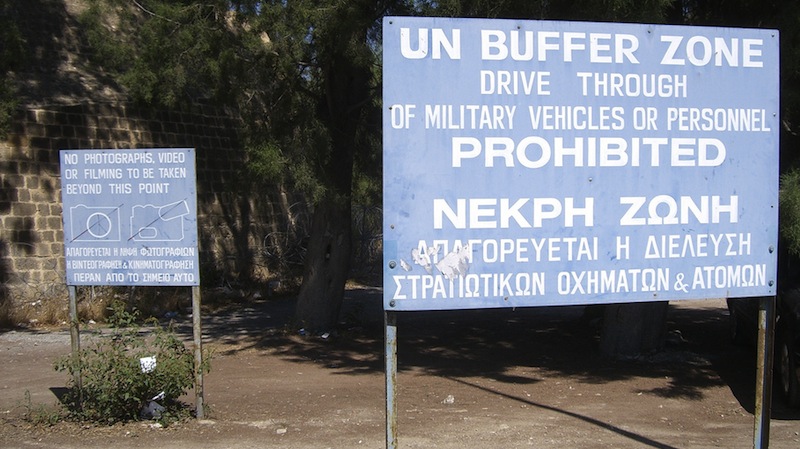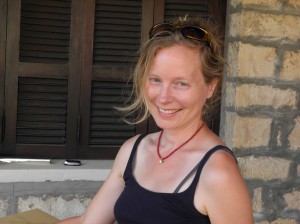Roundtable:
The Place of Cultural Translation
1. The Translator In Between
by Karen Emmerich
The reader’s process of alienation and reorientation lets us examine the purpose and methods of cultural translation. We asked writers and translators working today to share their thoughts and experiences of literary and cultural translation as a space that is perhaps simultaneously “old” and “new” for both the writer and the reader.
Six months after moving to Cyprus in the summer of 2011, I wrote to a friend in New York about an obsession I’d been developing with maps and place names. My obsession made sense: Occupying, partitioning, and renaming are practices with a long history on Cyprus. They predate by far the attempted coup, invasion, and subsequent war that resulted in the construction, in 1974, of the United Nations buffer zone that currently divides the island into the Republic of Cyprus in the South, and the Turkish Republic of Northern Cyprus (TRNC) in the North. The maps in the South, I wrote to my friend, don’t show street names in the North, just the outlines of streets under large letters reading TERRITORIES OCCUPIED BY THE TURKISH ARMY. So there are other “dead zones,” too—not just the buffer zone that runs down the center of this city. There are whole swaths of blankness (willed or otherwise) in the knowledge people have about the place where they were born, or to which they came. I wonder if there’s a point at which you cease being struck by it daily: the utter surrealness of living in a place so starkly divided, where every so often a street dead-ends into a pile of sandbags and barbed wire.
I myself had come to Cyprus to teach translation studies at the University of Cyprus. I was living in an apartment about a mile from the buffer zone, in the last divided capital in the world. My bedroom balcony faced the large Turkish flag built with white stones into the hillside north of Nicosia. Around 4:30 each morning I was woken by the muezzin’s call from a mosque across the border; a few hours later, church bells from a handful of churches within earshot would wake me once again. Most of my days involved at least one walk or bike ride down into the old city, where hip cafés and restaurants were popping up in a place that for nearly four decades had been abandoned to an odd mix of immigrants, tourist shops, wood-working shops, and older residents who had chosen not to leave their homes after the war. On the other side of the checkpoints, North Nicosia was a mirror image in a poorer shade, with shops and immigrants (primarily from eastern Anatolia) inhabiting the old city, while the land outside the walls was now clustered with the housing developments of relatively recent urban sprawl.
Long bike rides in the countryside to the south of the city sometimes took me past minefields still uncleared from the fighting in 1974, or through old Turkish Cypriot villages whose mudbrick homes were now crumbling, abandoned ten years before the war during a particularly virulent wave of ethnic violence. Meanwhile, the buffer zone and other traces of the war are only one set of historical markers, pointing to one potent episode in a much longer story. The Venetian walls that ring the old city testify to a centuries-long history of use and reuse, of successive occupations. The same is true of the ruins from far older periods; the left-side-of-the-street traffic and scattered examples of British colonial architecture on both sides of the buffer zone are reminders that the island also passed under British rule, with independence gained only in 1960. The ever-present Greek and Turkish flags, far more prevalent (in the South and North, respectively) than the flag of Cyprus with its yellow silhouette of an undivided island, are reminders of lingering, and highly problematic, ideological and political ties to those other places, too.

Image credit: Peter Collins (Flickr)
When I first arrived, I stayed with a close friend, a Turkish Cypriot who lived in the north of Nicosia. Each morning for a week or so, he or his father would drive me to one of the checkpoints and I would cross the buffer zone by foot, from the TRNC into the Republic of Cyprus—from a diplomatically unrecognized country into a recognized one, from one set of socioeconomic structures to another, one political system to another, one language (or, rather, one range of languages) to another. I spent my days driving around with real estate agents looking at apartments, or in line at the Aliens and Immigration Department, where I was again caught in the in-between: at the top of the stairs, a sign pointing to the left read DOMESTIC HELP, and to the right, EUROPEAN CITIZENS AND SPOUSES OF CYPRIOTS. I always went to the left, but with an awareness that there was no place for me there, no sign by which I could be made legible, as a legal and cultural outsider who was at the same time highly privileged.
In the evenings, as I crossed back over the buffer zone, a hundred-yard stretch of dust and stray dogs and buildings that hadn’t been entered in nearly forty years, Turkish words would fly at me again, like birds. It was almost as if the passage by foot became a linguistic passage, as well. Of course the little Turkish I knew was not Cypriot Turkish, nor is my Greek Cypriot Greek. And so my everyday encounters, even after months of living in Cyprus, were always infused with translation. The people at the market were puzzled by me; they asked if I was a kalamarou—a Greek woman, in not-very-polite Cypriot—and they shifted their language to accommodate me: They tried to speak kalamaristika, like a Greek person, because that’s how I spoke. Some could code-switch with ease, while others were more deeply rooted in their particular form of Cypriot. Meanwhile, among my hyper-educated friends, there were some who spoke only Cypriot, even with me—and so I was the one who had to shift, if not in speaking, then in listening. I had to learn to listen differently, and to be comfortable responding in a language other than the one in which I had been addressed. There was a radical otherness nesting in every encounter.
I lived on Cyprus for only a year. I’d moved there planning to stay, at least for a while, but a job came up back in the States and so I came “home.” Coming back from the Mediterranean is always difficult for me. During the decade I lived in New York, each time I flew back from a summer in Greece I would wait a week or two before I called anyone, to give myself time to catch up with my body. A friend once told me he thought airplanes were a terrible invention, that the rapidity of movement that’s now possible between places and languages and cultures is too jarring, that we all need two weeks on a boat to help us transition from continent to continent. And this time, coming “home” didn’t mean coming back to New York, a place whose intensity is at least on par with the galvanizing discomfort of Cyprus. This time, it meant moving to yet another new place, to Eugene, Oregon, a small city on the West Coast where it rained for eight months out of the year, a city that felt more foreign to me than any place I’d ever lived before.
“Opou kai na taxidevo, i Ellada me pligonei,” George Seferis wrote in 1936: “Wherever I travel, Greece wounds me.” It is one of the most-quoted lines of modern Greek verse, which makes sense for a country whose recent history has seen so much turmoil, so many waves of emigration and internal migration, so much displacement. For similar reasons, it resonates on Cyprus, an island where so many people are from elsewhere—economic migrants from other countries, or refugees displaced from their villages by the war—or have spent long stretches of time abroad for work or study. Maybe that’s one reason why Cyprus felt immediately like home—not, again, in a comforting way, but like a difficult, unnerving, sometimes nearly unbearable home in the in-between. Even here, just here, I wrote to the same friend a few months later, it’s always also an elsewhere, written and re-written so many times. Every street, every square, every place has so many names that perhaps people might eventually just leave the names behind. I wonder how that would be.
•
 Karen Emmerich is a translator of Modern Greek poetry and prose, and an Assistant Professor of Comparative Literature at the University of Oregon. Her most recent translations include Amanda Michalopoulou’s Why I Killed My Best Friend (Open Letter, 2014), Sophia Nikolaidou’s The Scapegoat (forthcoming with Melville House), and Eleni Vakalo’s Before Lyricism (forthcoming with Ugly Duckling Presse).
Karen Emmerich is a translator of Modern Greek poetry and prose, and an Assistant Professor of Comparative Literature at the University of Oregon. Her most recent translations include Amanda Michalopoulou’s Why I Killed My Best Friend (Open Letter, 2014), Sophia Nikolaidou’s The Scapegoat (forthcoming with Melville House), and Eleni Vakalo’s Before Lyricism (forthcoming with Ugly Duckling Presse).
